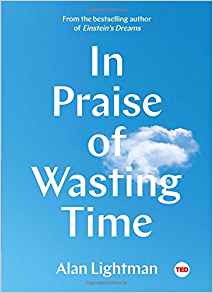 Alan Lightman, In Praise of Wasting Time (New York: TED Books, 2018), 102pp.
Alan Lightman, In Praise of Wasting Time (New York: TED Books, 2018), 102pp.
The ever-expanding TED Talks now include a series of two dozen books that, according to their website, "are long enough to explore a powerful idea but short enough to read in a single sitting. TED Books pick up where TED Talks leave off." Alan Lightman, a physicist and novelist at MIT, tackles one of the most disturbing trends of our age: our obsession with time, speed, and efficiency that is driven by our wired world, and that leads to all sorts of unfortunate consequences like over stimulation, distraction, loneliness, isolation, and depression. In his thought #139 Pascal observed that "all of humanity's problems stem from man's inability to sit quietly in a room alone." The Japanese even have a word for "overwork death" (karoshi) that is caused primarily by heart attack and stroke due to stress and a starvation diet.
Lightman wants to change this. In the first part of his book he documents what has now become obvious to many people: the many manifestations of our distracted age. He cites numerous scientific studies, along with examples from his own life, like how he changed when he finally bought a smart phone. Our technological advances have come at a steep price, like the loss of creativity, peace of mind, our social-psychological ethos, and nothing less than "the destruction of our inner selves." In the last half of the book Lightman proposes that we return to things like play (doing things purely for fun and amusement), creating spaces for our minds to wander, down time, meditation, and stillness. We somehow need to "create a new 'habit of mind,' as individuals and as a society. We need a mental attitude that values and protects stillness, privacy, solitude, slowness, personal reflection; that honors the inner self; that allows each of us to wander about without schedule within our own minds."
Christians have their own traditions of silence, of course: "Be still and know that I am God." One thinks of the Trappist monks who take a vow of silence, or the Eastern Orthodox mystical tradition of contemplative prayer called hesychism ("stillness"). And we are commanded to rest, and be like God, who did not work on the seventh day. In the words of the poet Wendell Berry, "the mind that comes to rest is tended / In ways it cannot intend. / Is borne, preserved, and comprehended / By what it cannot comprehend."
For more on this important subject I recommend two movies: Walk with Me (2017) about the monastery of the Vietnamese Buddhist Thich Nhát Hanh, and Into Great Silence (2005) about the remote Monastery Grand Chartreuse. And then the books by Jaron Lanier — You Are Not a Gadget (2010) and Ten Arguments for Deleting Your Social Media Accounts Right Now (2018); Sherry Turkle, Reclaiming Conversation; The Power of Talk in a Digital Age (2015); and Erling Kagge, Silence in the Age of Noise (2017).
Dan Clendenin: dan@journeywithjesus.net


